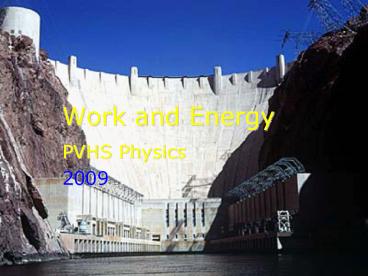Work and Energy - PowerPoint PPT Presentation
1 / 22
Title:
Work and Energy
Description:
Daily Science Question ... In the book, on websites, and in other references you might see... KE... How much KE does the book have when it hits? How fast? ... – PowerPoint PPT presentation
Number of Views:55
Avg rating:3.0/5.0
Title: Work and Energy
1
Work and Energy
- PVHS Physics
- 2009
2
Objectives
- What is energy?
- What is work?
- How do you determine the amount of work done on
an object? - What is the difference between work and power?
- How do you calculate power?
- What are potential and kinetic energy?
- How is energy related to work?
- What is conservation of energy?
- What is a closed system?
3
A Little Review
- In physics, work is defined as a force acting
upon an object to cause a displacement. - Three key words Force, displacement, and cause
- For work to be done There must be a force and
that force must cause a displacement
4
A Little Review
- Work equals Force times Displacement
- Force and Displacement are vectors
- Work is accomplished only by the component of the
force vector in the direction of the displacement
F
Fy
Q
Fx
y
d
x
5
More on Work
6
Daily Science Question
- On which ramp will the soapbox racer be moving
the fastest when it reaches the bottom?
A
B
7
What is Energy?
8
Kinetic Energy
- Kinetic Energy is energy stored in motion
9
Kinetic Energy
- Kinetic Energy is energy stored in motion
- Any object in motion, that has velocity,
possesses Kinetic Energy - KE related to the square of the objects velocity
10
Kinetic Energy
- Math Definition
- Energy is not a vectorbut
- You can add or take away energy
- The change in energy can be positive or negative
11
Relating Work to Kinetic Energy
- Kinetic Energy
12
Work-Energy Theorem
- The Work (W) done on an object is equal to a
change in its Kinetic Energy - W DKE
- Work transfers Energy into or out of a system
13
- Can forces do work without causing a change in KE
or velocity? - Where does the energy go if the Net work is zero?
14
Special Cases
- Friction
- Opposes motion always negative work
- Reduces the increase in kinetic energy
- Energy is lost for good (stored as Einternal)
- Gravity
- Moving against gravity stores energy
- Moving with gravity releases stored energy
- Elastic Forces (springs, rubber bands)
- Like gravity Elastic forces store and later
release energy
15
Potential Energy
- Potential energy is just stored energy
- Abbreviated as PE
- Usually based on an objects relative position
- Gravitational Potential Energy
- Higher objects have more potential energy than
lower objects - Elastic Potential Energy
- Energy stored in a stretched or compressed object
16
Other Conventions
- In the book, on websites, and in other references
you might see - KE energy stored in motion
- PE energy stored by gravity
- Peel energy stored elastically
17
Power
- Work equals force times displacement
- F x d can equal a F x d
- 100N x 5m 5N x 100m
- Which took more effort how can you
differentiate? - Power
- Relates time and work (or any energy transfer)
- Power is the rate at which energy is transferred
18
Power
- Remember Power actually relates energy transfer
to time - Work is not the only way to transfer energy
- Heat
- Radiation
19
Sample Problems
- A 70kg sprinter crosses the finish line moving 9
m/s. How much KE does the sprinter have? - You apply a 10 N force to a frictionless cart
with a mass of 5kg for a distance of 20 meters. - How much work did you do?
- How much KE does the cart have after 20 meters?
- How fast is the cart moving after 20 meters?
20
Sample Problems
- It takes you 1500 N-m of work to drag a chair 10m
across a carpeted floor. How much energy was lost
due to friction? - You drop a 2kg book and it falls 1m to the floor.
How much KE does the book have when it hits? How
fast? - How much power was used to lift a 100kg crate 5m
if it took 6 seconds?
21
Objectives
- What is work?
- How do you determine the amount of work done on
an object? - What is the difference between work and power?
- How do you calculate power?
- What are potential and kinetic energy?
- How is energy related to work?
- What is conservation of energy?
- What is a closed system?
22
Any Questions?































